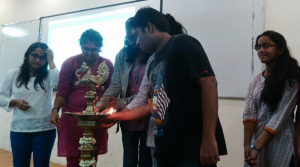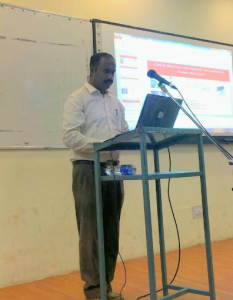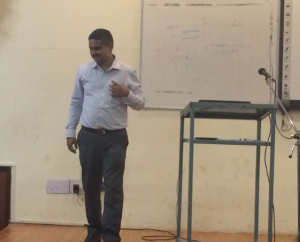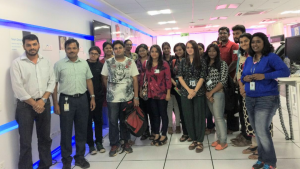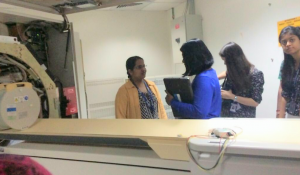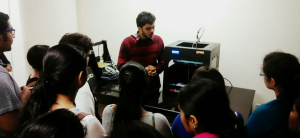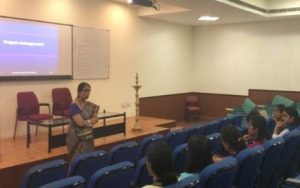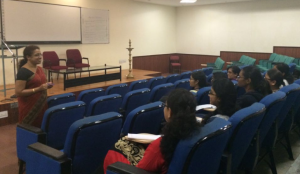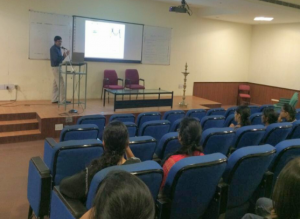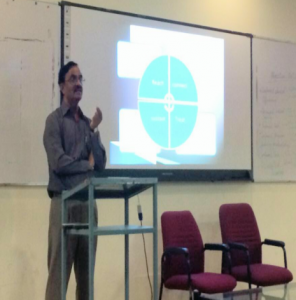The IEEE EMB MSRIT student chapter in association with IEEE EMB Bangalore chapter organized special school on “Clinical Electronics and Industrial Instrumentation” from 4th-11th August at the MSRIT campus.
The special school included visits to clinical industries, seminars based on clinical research and instrumentation, and also interactive sessions.
Day 1: 4th August 2016
The commencement of the school took place with an invocation song by two of the participants. Further the lighting of lamp was done signifying the inauguration of the school.
Lighting of lamp
Dr. N.Sriraam, HoDof the medical electronics department, explained about the aims and objectives of this special school. He taught the students about the latest and innovative technical developments in the medical field. He also stressed on the clinical need of vital signs monitoring, continuous bedside monitoring, healthcare delivery process, remote access to medical devices. He explained about computer aided diagnostic screening tool for fetal cardiac chamber detection using ultrasonic cine-loop sequences and vein imaging system.
Talk by Dr. N.Sriraam
Further there was an interactive session on medical device design process and its biocompatibility by Mrs.Supriya Babu. It provided the knowledge about designing process and a way to solve the existing problem statements for the students. She also taught about the design environment and bio-designing. Based on this session the participants were made to develop a problem statement and try to come up with a solution for it. This helped the students to improve their skills regarding need statements and problem solving methodology.
Talk by Mrs. Supriya Babu
The day ended by a talk by Dr. Nanda Kumar. He spoke about the current needs in medical industry and their practical applications. He provided a brief knowledge about the term demographic shift and how it requires smaller, affordable, adaptable domesticated devices especially for the geriatric group. He concluded on a note-look, think and work together.
Talk by Dr. Nanda Kumar
Day 2: 5th August 2016
The second day the students were provided an opportunity to visit Philips Innovation Campus, one of the leading company in clinical industries. There the students learnt about medical devices like CTR and MRI scanners, their purpose, principle, mechanism involved, practical usage and applications.
Later the students had an interactive session with the biomedical engineers working at Philips. There the students acquired very good knowledge about the different aspects involved in bio designing like critical care or the fault detection mechanism and the data base history. The day was concluded by gaining knowledge about telemedicine CDA systems and other new evolving technologies in the field.
Visit to Philips Innovation Campus
Day 3: 6th August 2016
This day was scheduled to another industrial visit.IKP-EDEN is a Start-up Incubator with in-house DIY Makerspace.It was a place for innovation and creativity where students learnt about different devices and the technologies involved. They were taught the usage of 3D printers and its mechanism. They also explained about Small Camera DIY Studio and Interactive LED Panel. The students were briefed about infusion monitors, PCB designing Bluetooth modules and devices developed for diabetic patients.
Visit to IKP-EDEN
Day 4: 8th August 2016
The fourth day was scheduled for hands on session regarding microcontrollers and other latest technologies. It was conducted in the medical software lab at the MSRIT campus.
The speaker was Mr. Samson Richard. He is a software developer at Aeronautical development agency. He gave an insight about the history of the microcontrollers and microprocessors, their definition, typical architecture, their designing and applications. He also spotted out the difference between microprocessors and microcontrollers and their way of operation.
There was an interacting session on assembly language program, compilers, cross-compilers, system on chip, programmable system on chip, inter integrated circuits, open source in embedded systems, internet of things and the cloud. This helped the students to bridge the gap between software and hardware designing.
Hands on session by Mr. Samson Richard
Day 5: 9th August 2016
There were a series of small sessions held on this day. The faculty of MSRIT interacted with the participants.
The first session was by Mrs. Prabha Ravi. She taught about adaptation and compromising, research and technology, medical devices and their classification, probability-prediction and estimation, image and signals.
Talk by Mrs. Prabha Ravi
The second session was by Mrs. Prabhu Ravikala Vittal. The students were briefed about project planning and its management, constraints occurrence during it, and project life cycle. The different set of stages involving project management and design phase were told.
Talk by Mrs. Prabhu Ravikala Vittal
The third session was by Raghu. He explained about image and signal processing, false colouring using MATLAB.
The fourth session was by Mrs. Tejaswini S. She explained about twenty one levels of pain, smart baby monitoring, classification of pain and telemedicine.
The fifth session was by Mrs.Chandana.S. She discussed about questions in research, types of papers, interest and desire and intelligence levels.
Talk by Mrs. Chandana.S.
The sixth session was by Mrs. B. R. Purnima. She taught about research, KWHL charts and literature review.
Day 6: 10th August 2016
The first session was by Dr.Arun Kumar. He taught about K-wire implants, joints, orthopedic bioengineering and BP measurements.
Talk by Dr. Arun Kumar
The second session was by Adithya. He explained about identification, invention and implementation-three steps in medical device design and development.
Later the third session included a visit to the department ofM S Ramaiah applied sciences. The students were taken around the campus and were introduced to vital science simulators, machines that stimulate and respond accordingly to the situations. These systems were a prototype for the undergraduate medical students to practice the surgery and to take tests. This helped the participants to acquire knowledge about the bio medical field, and mechanism of machines like defibrillator, osculation machines and endoscopy.
Day 7: 11thAugust 2016
The last day of the school was scheduled for an interactive session with Dr. Shyam Vasudeva Rao, President and CTO Forus Health Pvt. Ltd. He spoke about democratising healthcare and the importance of health in one’s life as well as in society. He spoke about the health care continuum and the steps involved in it. He also explained about the healthcare accessibility and affordability strategy, pediatric vision problem: the solution, overview of the solution. He inspired the students by talking about the possibility of robotic treatments, sleep monitoring applications, neonatal caring equipments and identification of diseases in their chronic stages.
He spoke briefly about the current conditions and facilities in India and explained the need for equipment that is more accessible, easily affordable with appropriate technology. He concluded the session by talking about the necessity of antibiotic management, X-ray management and the process of bringing up a personalized medical record or electronic medical record in India.
Talk by rd. Sham Vasudevarao
The special school was successful in providing the students sufficient knowledge about the healthcare Industry, the skills of project management. It also helped the students to develop solutions for the existing problems and to improve the quality of life.

